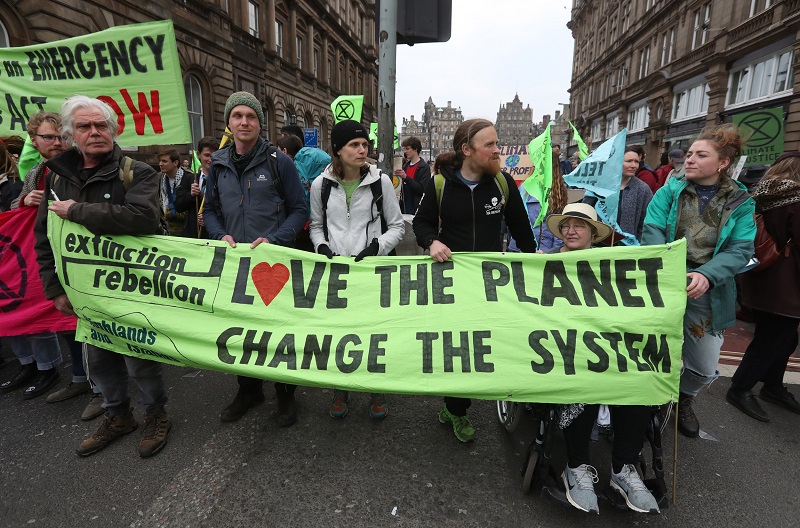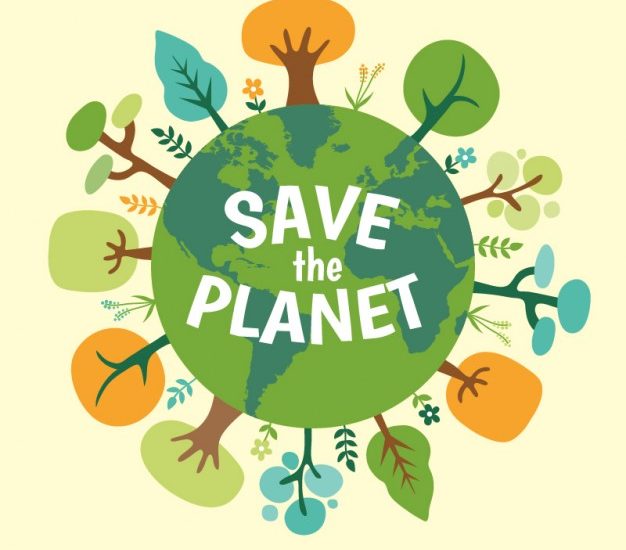We’re finally in an age where caring for our environment is normal, perhaps even expected of us, and its amazing how far we’ve come in just a couple years. But it’s hard, and it’s overwhelming to think of how we can change our lifestyle to such a degree where it will make a difference, and its almost impossible to imagine how doing something as small as say ditching a single-use coffee cup can really make a difference on a global scale. Not to mention the fact that our environment is geared up against us and more often than not, moving towards a zero waste lifestyle requires money.
While we do want to see big changes and fast, I don’t believe that it’s practical or possible for most people to completely overhaul their life and change to zero waste overnight. If we instead start small, make one really good change, then another, and another before we know it our life has been overhauled into a much more sustainable and environmentally friendly one.
So to mark the the end of Climate Week 2019 here are 50 small changes to make in your life which can make a difference to our planet. I certainly don’t do all of these, and some are easier to adopt than others in my life, but I see it as a checklist and a set of goals to strive for.
Out and about
- Swap to a re-usable coffee cup. I’ve tried a few travel cups and there is a lot variation in them. My boden mug is by far the best I’ve used. It cost around £10 from TK Maxx, is lightweight, nice to drink from, and keeps my coffee hot for about 2 hours.
- Swap to a re-usable water bottle. If you can find one which works for all aspects of your life (cycling, the gym, work, commuting) rather than buying several, then you’re onto a winner. I love the style of Chilly’s bottles but prefer the practicality of my sistema bottle with its straw.
- Keep a bag for life in your handbag: I carry a big canvas tote in my handbag but it is a little bulky. Most shops will sell fold up shopping bags if you need something smaller.
- Swap to re-usable straws: There’s a great range of re-usable straws out there now: silicone, metal, plastic, bamboo. Buy these in bulk, enough for your family, and stash one where you think you’ll need it. I.e. in your handbag, the baby changing bag, in your desk at work.
- Bring empty containers to the supermarket to use at the fish/meat/deli counters: You won’t be charged extra for the weight but it will cut down use of non-recyclable plastic bags.
- Walk or cycle short journeys: For environmental impact, it’s recommended we ditch the car for any journeys under 2km. So on those short trips for school pick up, the corner shop, the post office etc give yourself extra time and walk or cycle.
- Turn the ignition off in a stationary car: It’s a tough one to do in winter, particularly with kids in the car, when its cold and you want the heating on. But it can make a big difference to CO2 emissions and our health.
At home
- Mend your clothing: learning how to repair tears and holes, replace buttons, and darn a sock will help reduce what we throwaway. Check out classes in your area, YouTube for tutorials, or books at the library.
- Make the most of household recycling and local recycling centre: you’d be amazed at what you can recycle via the council: Batteries, small electrical items, clothing, books, bikes etc. Head to their website and find out what is accepted in your area.
- Fill the kettle up only with the water you need: Boiling the kettle uses a fair amount of energy but this can be cut down by reducing the amount of water in the kettle.
- Turn the lights off when you leave a room: An easy one for me to remember considering my parents spent most of my childhood yelling “it’s like Blackpool illuminations in here, turn the lights off!”
- Buy secondhand: check out Gumtree, Facebook Marketplace, charity shops, Freegle etc for any household items or clothes you need and save some money.
- Invest in rechargeable batteries: You’ll save money in the long-run and not have to worry about recycling used batteries either.
- Swap to LED lights: again pricier output but saves money in the long-run and they’re safer since they don’t heat up.
- Opt for paperless mail: for your regular bills.
- Invest in recycling bins: to sort and store recycling at home. IKEA do a good range of bins like these.

In the kitchen
- Save takeaway tubs and use as tupperware: Most survive the dishwasher fine, and they stack neatly in the freezer making them great for batch cooking & freezing meals. I also take my lunch to work in takeaway tubs.
- Take tubs for takeaway: If your usual takeaway haunt uses polystyrene or other non recyclable materials, consider taking your own tubs or beeswax wraps along. Perhaps not possible for delivery, but definitely for lunchtime takeaway.
- Eat less meat: You don’t need to completely switch to vegetarian, just start with meat-free days and aim for meat as a treat.
- Stop buying cling film and tin foil: These can’t be recycled and there are loads of alternatives from tupperware, silicone lids, beeswax sandwich wraps, or even a trusty plate over a bowl.
- Recycle food waste: There are 3 ways to do this: (1) use your council food waste bin which turns food waste into energy; (2) make your own compost for your garden with kitchen scraps; (3) save coffee grounds and use it as a fertiliser for the garden. Keep the caddy under the sink and use composting bags.
- Package free shopping: Zero waste supermarkets are cropping up everywhere. Find your local one and buy store cupboard items in bulk.
- Buy in bulk: It works out cheaper and buying 5kg of rice produces less waste than 10 bags of 500g rice.
- Buy tinned products rather than cartons: cartons aren’t always readily recycled compared to tins.
- Opt for milk delivery: the milk is usually available in glass bottles which are collected, washed, and re-used; bonus points for finding a delivery company with electric vehicles too.
- Opt for items with less packaging: Zero waste shopping is tricky in everyday life, so consider buying items which have less packaging.
- Meal plan: Plan your meals, create a shopping list, and buy only what you need. You can save money and reduce food waste.
- Eating seasonally: can reduce carbon footprint from airmiles, and encourage creativity in the kitchen. Consider getting a weekly veg box delivered which often contains seasonal food.
- Ditch the slow cooker: and invest in a pressure cooker. Pressure cookers use less cooking time and energy than slow cookers (the clues in the name) and produces dinner quicker. I personally recommend the Pressure King Pro.
- Ditch the teabags: which can contain plastic, and swap to loose leaf tea with a tea strainer.
- Swap to re-usable fabric cloths: rather than throwaway cloths. Wash them regularly by soaking in the sink with bleach and washing liquid.

In the bathroom
- Swap to a mooncup: if this isn’t for you, then try reusable sanitary pads or compostable tampons which you can order online.
- Ditch the cotton wool pads: Swap to a face cloth or reusable pads instead and wash them at the end of the week.
- Swap to cloth nappies and/or wipes: Making the switch from disposable to reusable nappies and/or wipes is daunting with a young baby. But it doesn’t need to be all or nothing. Swap to reusable for the nighttime nappy, at the weekend, or 1 day of the week only.
- Don’t run the tap when brushing your teeth: Just give the sink a rinse when you’re done to remove any toothpaste foam.
- Swap to bar soap: and look for ones which are packaged in recyclable or compostable material. Shampoo and conditioner, and body wash can also be bought in bar form.
- Zero waste shaving: and swap to retro metal razors with replaceable blades and shaving foam bars with a brush.

In work
- Take the stairs, not the lift: particularly when the lift is only carrying one person. If you have a big flight of stairs to climb, then climb 1 flight and take the lift and build it up from there.
- Turn off your monitor when away from your desk: Do this instead of lock screen, and keep a note on your desk to remind yourself to make it a habit.
- Print less: Go as paperless at work as possible. Take your laptop or tablet into meetings rather than printing documents; make notes on the computer rather than a notepad.
- Print double-sided and in a smaller font: If you do need to print.
In the garden
- Grow your own herbs: Saves money, and reduces kitchen plastic and waste from buying herbs from supermarket. Click here for advice on how to grow them.
- Grow your own food: Start small with easy things like garlic, onions, potatoes and go from there.
- Upcycle in the garden: welly boots, broken pots, tin cans can all be re-purposed as containers for plants; pallets can become a multitude of different furniture etc. Check out Pinterest for ideas.

In the community
- Organise or join a community litter pick: and keep your neighbourhood clean. Check out council recycling for the waste collected and re-use the bags/boxes used to collect the litter.
- Borrow and hire, rather than buy: Speak to your neighbours and find out whose got lawnmowers, carpet cleaners, ladders etc rather than buying your own. Or hire from local companies.
- Donate: gather up unwanted clothes, shoes, unopened toiletries, food, household items etc. And donate them to charity shops, food and clothing banks in the area.
- Organise a swap-shop: with friends, family, neighbours etc. It doesn’t need to be just for clothing, but also school uniforms, children’s costumes, toys, household items etc.
- Freebies: list unwanted items for free with uplift on Gumtree, Facebook marketplace, or Freegle. This is a great way of getting rid of bulky unwanted items like sheds, furniture, bikes etc.
- Join a political movement: and campaign for legislative and policy change.

If you’ve got any tips not included in this list, please do share below in the comments. I’ve love to hear what everyone does to make a difference.

